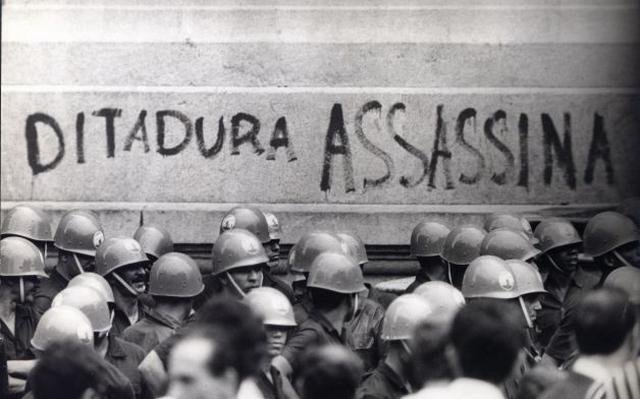60 Years of the 1964 Civil-Military Coup: Will We Have Another Lost Opportunity?
Rafael R. Ioris, Professor at the University of Denver and WBO (Washington Brazil Office) Research Fellow. This article was written by Ioris especially for issue 110 of the WBO weekly newsletter, dated Mars 29, 2024. To subscribe to the newsletter, enter your email in the field below.
Personification is one of the best-known linguistic resources in International Studies. After all, who hasn't heard something like "Brazil needs to grow" or "the USA has to decide whether or not it wants to be the world's police”? Using this logic, which transfers human characteristics to non-animate beings, I suggest that, just as in personal life in which we are repeatedly forced to choose between different paths, in the arena of nations difficult choices also need to be made with long-term vision and courage. Otherwise, historic opportunities will be lost, resulting in harmful consequences not only for an individual, but for an entire community.
A moment of such magnitude presents itself again for the Brazilian population, especially for its elites. After all, the 60th anniversary of the fateful civilian-military coup of March 31, 1964 is approaching, which not only destroyed what until then had been one of the most important and promising experiences of democratic coexistence in Brazil, but also cost lives and dreams of thousands of people. It also strengthened an unfair development model and an authoritarian and exclusionary project for the country in economic, racial, and gender terms.
In fact, contrary to what the heirs (the so-called widows) of the 1964-1985 military regime with business backing have sought to assert in recent times through aberrant, ill-informed or perverse, but certainly not naive, historical distortions about the most important experience of authoritarianism, the country has lived through a period of peace, order and progress. What we effectively had was oppressive military rule in which the armed forces only agreed to withdraw from the scene, at least in part, through a slow, gradual, and safe transition to a regime with strong democratic institutions, which, nonetheless, were still too restricted. This reality is so unquestionable that although many social movements fought throughout the 1970s for a more substantive redemocratization in which violations of human rights committed by the regime were punished, our transition, unlike what occurred in neighboring Argentina, for example, was controlled from above. The process took about a decade, and the amnesty imposed by the regime was, finally, incorporated into current democratic institutions.
And if we were unable to take advantage of the moment of transition to create a stronger democracy, since then, we have not, in fact, tried to face the consequences of a controlled, weak and insufficient transition. Scholars organized many academic events about the dictatorship and its legacies around the time of the 40th anniversary of the 1964 coup d’état. The same happened on the 50th anniversary, and now again on the 60th anniversary. Nothing could be more important and necessary.
“It is essential that Lula, as the great leader of the movement in defense of democracy who came to power in 2022, has the courage to correctly read the historical moment in which we live to call the nation to a dialogue on the historical legacy and recent development of authoritarianism in Brazil”
The fact is that all these times, little discussion took place beyond academic and intellectual circles. This reality reflects the way in which this issue is perceived by the general population. It also reflects, tragically, the low priority that the issue has been for political leaders of various ideological stripes who have led the country over the last thirty years.
If in 2004, or perhaps even in 2014, the legacy of armed forces that never had to answer for their crimes and that still perceive themselves as holding a veto over democracy could perhaps be ignored (with all its harmful consequences, as we saw recently), today, on the 60th anniversary, after a new coup attempt led or at least supported directly or indirectly by members of the military high command, this issue still becomes urgent and inexorable.
We are experiencing a democratic crisis around the world that has served as an excuse, at least in most countries, to strengthen the salvationist agenda of the ultra-right, almost always through the cult of the sexist, prejudiced, and authoritarian great leader. Interestingly, within this worrying context, Brazil is today an exception. In fact, after four tragic years of the spread of authoritarianism and renewed military rule, the country managed to mobilize all its democratic forces to guarantee a fair election and respect for the popular mandate arising from the ballot box. In this sense, Brazil's role in today's world expands beyond its borders, as an example of the defense of democracy, human rights, and democratic coexistence.
It is, therefore, essential that Lula, as the great leader of the movement in defense of democracy who came to power in 2022, has the courage to correctly read the historical moment in which we live to call the nation to a dialogue on the historical legacy and recent development of authoritarianism in Brazil, as well as how to deepen the rules and democratic coexistence in the country. There should be no more trying to turn the page, ruminating, and then moving on.
Yes, this is a government without a congressional majority in a country where the armed forces still feel as if they actually have power. But this is exactly why, pedagogically, the nation's chief leader should call on the population to undertake the task of deepening their democracy, a process that implies the rejection of the logic of deal-making and agreements that have done so much harm in the country's history. After all, whoever does not face the ghosts of the past will always be haunted by them in the future.


